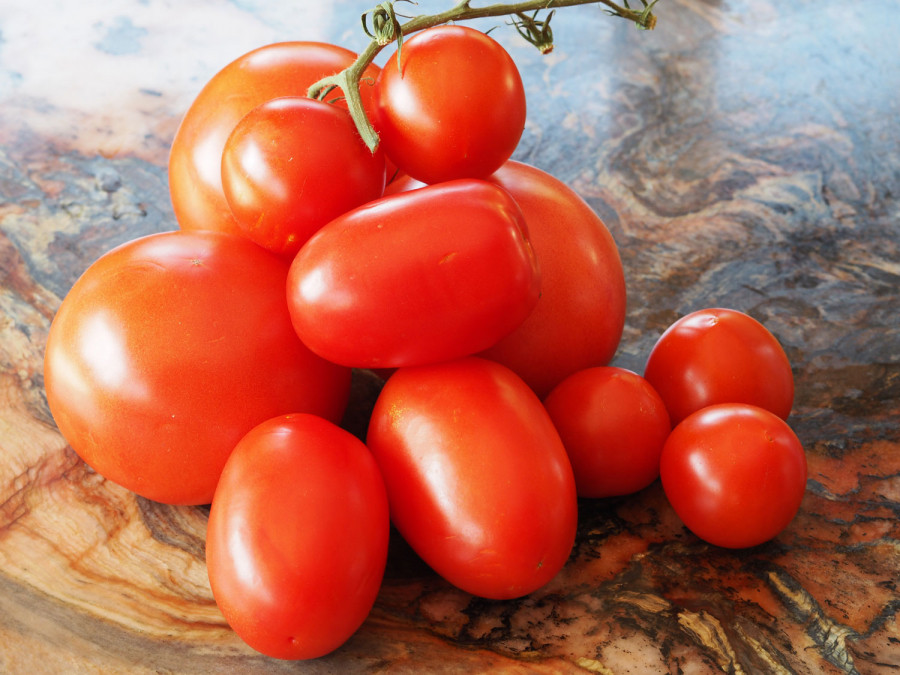Not only providing many essential vitamins to help brighten eyes and beautify skin, tomatoes have also been proven to lower blood pand protect the heart.ressure
1. Eating tomatoes every day can significantly reduce blood pressure
The results of a study published in the European Journal of Preventive Cardiology show that tomatoes and tomato products can play a role in preventing and controlling high blood pressure. According to the study, consuming more tomatoes will reduce the risk of high blood pressure by 36%, and even moderate consumption can lower blood pressure.
The study looked at over 7,000 people (aged 55 – 80) participating in the Spanish PREDIMED dietary intervention study. About 83% of them had high blood pressure and all had one or more other cardiovascular risk factors, such as diabetes, smoking, high cholesterol, being overweight or having a family history of early-onset heart disease. Everyone filled out an annual questionnaire about their food consumption, including raw tomatoes, tomato sauce, and gazpacho (a Spanish tomato soup).
After three years, the researchers observed a link between eating more tomatoes and lower blood pressure. They also found that among participants who did not have high blood pressure at the start of the study, those who consumed the most tomatoes (about one large 110g tomato per day) had a 36% lower risk of high blood pressure overall, compared with those who consumed the least (less than 44g).
The researchers believe that the high levels of lycopene in tomatoes may be responsible. Lycopene, a plant chemical that gives tomatoes their red colour, is a powerful antioxidant that fights inflammation and cell-damaging molecules.
Tomatoes are one of the most consumed, widely available and affordable vegetables in the world, and are an important part of some of the healthiest diets, including the Mediterranean diet, said study co-author Dr. Rosa Maria Lamuela-Raventos, director of the Institute of Nutrition and Food Safety at the University of Barcelona (Spain).
Tomatoes are also rich in potassium, a nutrient known to help lower blood pressure by reducing the effects of sodium in the body. They also play an important role in many heart-healthy diets, according to Dr. Rosa.
2. The Role of Tomatoes in Heart Health
Tomatoes were the target of this study because they are easy to find and relatively inexpensive, making them popular in some healthy diets around the world. Tomatoes are also a food recommended by the American Heart Association (AHA) to lower blood pressure, mainly because they are high in potassium.
There is a large body of data showing that higher potassium intakes are associated with lower blood pressure levels. Reducing sodium and increasing potassium is a well-established lifestyle modification to reduce the risk of hypertension, says Gregory Katz, MD, a cardiologist at Langone Health. Increasing consumption of potassium-rich tomatoes is an effective way to increase dietary potassium.
In addition to potassium, tomatoes are a good source of lycopene. Lycopene is a carotenoid that has several cardiovascular benefits, including antioxidant, anti-inflammatory, anti-atherogenic, and anti-platelet effects. Research suggests that these properties also contribute to tomatoes’ significant blood pressure-lowering properties.

Eating lots of tomatoes has been linked to a reduced risk of high blood pressure.
While there aren’t many randomized clinical trials looking specifically at tomatoes for reducing the risk of high blood pressure, it’s likely they have a role due to their potassium and lycopene content. Dr. Katz says the current study is limited because it’s observational. However, he also says there are no known downsides or negative effects to eating 1-2 tomatoes a day.
Of course, adding just 1-2 tomatoes a day to your diet won’t lower your blood pressure. It’s important to include them as part of a balanced, heart-healthy diet with whole grains, legumes, and healthy fats. These recommendations are consistent with the DASH diet, which has been shown to lower blood pressure and protect the heart.
Eating a variety of potassium-rich foods also helps ensure you meet your potassium needs while also getting your vitamins, minerals, and antioxidants.
Other potassium-rich foods that are part of a heart-healthy, blood pressure-lowering diet include:
- Avocados
- Yogurt
- Bananas
- Oranges and orange juice
- Spinach
- Raisins
- Tuna
- Radishes
However, Dr. Katz also notes that too much potassium can be harmful for people with kidney problems, which are common in people with high blood pressure. The kidneys are responsible for removing potassium from the blood, and if they can’t do their job effectively, it can lead to hyperkalemia, a serious condition that involves a buildup of potassium in the body.
Regular exercise is also really important for controlling blood pressure, even more so than diet, says Dr. Katz. Before significantly increasing the amount of potassium you eat or taking an over-the-counter potassium supplement, be sure to talk to your healthcare professional or cardiologist.





